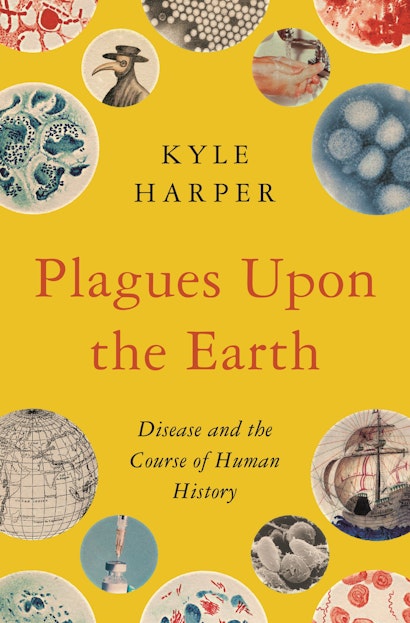Plagues upon the Earth is a monumental history of humans and their germs. Weaving together a grand narrative of global history with insights from cutting-edge genetics, Kyle Harper explains why humanity’s uniquely dangerous disease pool is rooted deep in our evolutionary past, and why its growth is accelerated by technological progress. He shows that the story of disease is entangled with the history of slavery, colonialism, and capitalism, and reveals the enduring effects of historical plagues in patterns of wealth, health, power, and inequality. He also tells the story of humanity’s escape from infectious disease—a triumph that makes life as we know it possible, yet destabilizes the environment and fosters new diseases.
What was it like to write a book about a pandemic during a pandemic?
KH: Surreal! I published my last book, The Fate of Rome, in 2017. A big storyline in that book is how new infectious diseases caused major mortality crises in the Roman Empire. I’ve been interested in pathogens and the history of health for a long time, but writing that book got me really hooked and also convinced that there was still a lot to be said. So I started writing a global history of disease that would run from our primate origins down to SARS-1 or Ebola. It was partly framed as a warning. One constant pattern of history is that microparasites adapt to take advantage of the opportunities they are presented. The basic principles of ecology and evolution help us understand why, and I think it’s helpful to try to think of human history in ecological terms. So another pandemic was inevitable, but I had no idea, obviously, when I started writing Plagues upon the Earth in 2017 that I would finish it in the shadow of a terribly devastating and destabilizing pandemic caused by a novel respiratory virus that seems diabolically adapted to exploit the globalized networks we have created. Certainly I hope to put COVID-19 in a deeper perspective, but I didn’t conceive of this book as a COVID book.
How have infectious diseases shaped human history?
KH: In every way. Infectious diseases are a really pervasive fact, and there is hardly a dimension of human social life that hasn’t been affected by pathogens. The real challenge is to disentangle some of the main ways in which diseases have affected history and to try to understand the dynamics of cause and effect. It’s important to understand that before 1900, even in the most developed societies, most people died of infectious disease. Tuberculosis, plague, smallpox, typhoid, typhus, malaria, influenza, shigellosis, and so on, accounted for most mortality. So understanding infectious disease is central to understanding human demography. Moreover, the force of infectious disease is highly variable in both space and time. Understanding geographic differences in the patterns of infectious disease is a fundamental part of global history. Understanding epidemics and pandemics—sudden increases in the prevalence of a disease, often with high mortality—is crucial to understanding processes of growth and decline.
You say that human societies create disease—what does that mean?
KH: I try to look at our species as we might look at any other animal, to understand what ecological factors account for the diseases we have. It turns out that humans have a lot of microparasites, a lot of them are highly specialized in exploiting us, and a lot of them are really nasty (i.e. virulent). The key to understanding why lies in our history—the way that human expansion has created ecological contexts for pathogens to evolve. We have enormous populations. We are sedentary. We live in cities. We have a deep relationship with other animals, including commensals and domesticates. We construct networks that connect disparate human populations into a metapopulation. We are globally distributed. All of these factors—and the ways they have changed over time—help us understand how our disease pool came into being.
What does the book tell us about COVID-19?
KH: I’m a historian rather than a journalist or futurist, so covering COVID-19 in the final pages of the book was one of the hardest parts of writing Plagues upon the Earth. Historians prefer perspective! But what I try to do in my final chapters is flip the way we understand the ecology of infectious diseases in modern history. Too many narratives are implicitly or explicitly triumphant: in the past every died of infectious disease, then humans developed public health, antibiotics, vaccines, and so on, so now we die of chronic or organ diseases. I argue that we should instead see the modern period as a time of increasing tension between human control and pathogen evolution. There is no denying that modern science and modern states have given humans amazing tools to control disease. In some ways, our achievement is maybe even more amazing than we have realized. Because modern growth has actually accelerated the emergence of new, dangerous diseases—cholera, influenza, polio, AIDS, COVID-19. Our tools have also gotten more and more powerful, but we never have anything like complete control. So COVID-19 isn’t a breakdown or a reversal or an unexpected outcome. Rather, a lot of pressure has been building, and given the nature and limits of our tools, it was really likely that a respiratory virus was going to arise to challenge us.
Does the emphasize on germs mean that human history is really determined by forces of nature? Is this a kind of determinism?
KH: Let me be provocative and say yes, a little bit. Throughout this book (as in my last one), I try really hard to say that the key is trying to understand the dynamic relationship between human agency and nature. Germs never determine anything on their own. At the same time, I think human history should take seriously the role and agency of nature. I think it’s important to try to get to know our germs—what they are like, how they operate, what rules govern their success and failure. Smallpox, measles, tuberculosis, cholera—these are amazing (and really awful) species of microbes with very different capabilities. So it is a kind of history that seeks to integrate biology and social science to understand the human past in a richer way.
Kyle Harper is professor of classics and letters at the University of Oklahoma. His books include The Fate of Rome: Climate, Disease, and the End of an Empire (Princeton) and From Shame to Sin: The Christian Transformation of Sexual Morality in Late Antiquity. He lives in Moore, Oklahoma. Website kyleharper.net Twitter @Oklahomaharper

